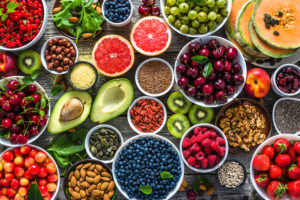By Iris Farrou
07 Feb, 2023
Health Conditions and Pregnancy, Lifestyle Tips, New Moms, Nutrition, Pregnancy, Queer Health, Women's Health
Healthy weight gain pregancy, How much weight should I gain in pregnancy, How to manage weight during pregnancy, Normal weight gain during pregnancy, Pregnancy diet, Pregnancy Nutrition
 If you are expecting, or are thinking of becoming pregnant, it is possible that you are also worried about your body weight. Many expecting mothers have faced this worry before, as pregnancy significantly alters your body and is expected (and should) increase your body weight. At the same time, you want to make sure that you experience a healthy pregnancy and don’t put yourself or your baby in danger. First of all, you should remember your baby weighs around 7-8 pounds– that’s a big chunk of pregnancy weight! Additionally, your placenta, a larger uterus, and amniotic fluid add about 2 pounds each. You will also experience an increased blood volume of 3-4 pounds, and increased fluid volume of 2-3 pounds, as well as larger breasts which add 1-3 pounds. It is important to remember that your fat stores, which are much needed for a healthy pregnancy and delivery, will add 6-8 pounds.
If you are expecting, or are thinking of becoming pregnant, it is possible that you are also worried about your body weight. Many expecting mothers have faced this worry before, as pregnancy significantly alters your body and is expected (and should) increase your body weight. At the same time, you want to make sure that you experience a healthy pregnancy and don’t put yourself or your baby in danger. First of all, you should remember your baby weighs around 7-8 pounds– that’s a big chunk of pregnancy weight! Additionally, your placenta, a larger uterus, and amniotic fluid add about 2 pounds each. You will also experience an increased blood volume of 3-4 pounds, and increased fluid volume of 2-3 pounds, as well as larger breasts which add 1-3 pounds. It is important to remember that your fat stores, which are much needed for a healthy pregnancy and delivery, will add 6-8 pounds.
Though these amounts may differ from person to person, the general weight added to a mother’s body by the end of pregnancy is about 30 pounds. Most expectant mothers gain 1-5 pounds in the first trimester and 1-2 pounds per week in the second and third trimester. According to the American Pregnancy Association, a pregnant woman of relatively normal weight who gets less than half an hour of exercise every week should have a calorie intake of 1,800 in the first trimester, 2,200 in the second trimester, and 2,400 in the third trimester. It is suggested that you limit processed foods, sugars, and extra fats when you are thinking about your diet while pregnant.
The first idea that pops into mind when thinking about a healthy diet during pregnancy is supplements and vitamins. Though these are definitely important, and prenatal vitamins ensure you don’t miss out on key nutrients, you do need to decide on the specifics by consulting with your doctor or healthcare provider. It is ideal to start taking a daily prenatal vitamin at least three months before conception. Discuss your options with your doctor before deciding, as supplements need to be tailored to add on to your current diet, any special diet, health conditions, and you need to know about possible supplements that do not have a good track record and may harm your pregnancy.
Other than supplements, the principle of any healthy diet applies to pregnancy as well– make sure you consume plenty of fruits, vegetables, whole grains, healthy fats, and lean protein. Here are the nutrients that deserve special attention during your pregnancy:
- Folate and Folic Acid: this helps decrease the risk of premature birth or low birth weight. It is also a B vitamin that helps the healthy development of the brain and spinal cord.
- Calcium: you may already know calcium is necessary for healthy bones and teeth, and both you and your baby need it. Did you know that calcium also helps the circulatory, muscular, and nervous systems?
- Vitamin D: this can work together with calcium to ensure healthy bones and teeth. Vitamin D is most commonly found in fatty fish, fortified milk, and orange juice.
- Protein: you want to keep on intaking protein throughout your pregnancy as it supports your baby’s overall growth and development. You need at least 71 grams a day.
- Iron: remember that during pregnancy you need double the amount of iron that non-pregnant persons need. The body uses iron to make hemoglobin, a protein in the red blood cells that carries oxygen to the body’s tissues. If you don’t get enough iron during your pregnancy, you may be at risk of developing anemia.
https://americanpregnancy.org/healthy-pregnancy/pregnancy-health-wellness/pregnancy-weight-gain/
https://www.mayoclinic.org/healthy-lifestyle/pregnancy-week-by-week/in-depth/pregnancy-nutrition/art-20045082
More
Many women look into bettering their overall health when they plan a pregnancy, but good habits should start with a healthy conception. In addition to regular doctor’s exams and other medical advice, diet and exercise can help with conception and help support a healthy pregnancy.
Exercise
Although heavy or extreme exercise should be avoided during pregnancy, there is nothing to prevent you from preparing your body for a healthy pregnancy. Implementing regular exercise into your schedule will not only help you increase your stamina for labor and delivery, but it can also improve your fertility (especially if have polycystic ovarian syndrome that can lead to trouble conceiving). There is no need to wait until you are pregnant to start exercising, as making it a habit is guaranteed to also help you lose the baby weight faster!
A variety of physical exercises can be done to spice up your routine but remember that during a pregnancy you need your back and abdominal muscles to be stronger in order to help you with the increasing weight in your tummy area, as well as the swelling of your breasts. As such, you may want to focus on exercises that strengthen your core and will eliminate the pain most women experience during pregnancy. It is also suggested that you do cardio to keep your heart rate up and stay in good physical and mental health before, during, and after your pregnancy.
Diet
Diet and exercise go hand in hand, so here are some tips on what foods you can add to your diet to help you support your fertility:
- Eat foods rich in antioxidants, as those have been proven to improve fertility in both men and women. These foods include fruits, vegetables, nuts, and grains.
- Choose a bigger breakfast, which can help both balance your diet and improve the hormonal effects of polycystic ovarian syndrome—a major cause of infertility.
- Add fiber to your diet though fruits and veggies, whole grains, and beans. Fiber generally helps remove excess estrogen, though studies on its exact advantages are not yet conclusive.
- Get your protein from vegetables! Swapping meat protein with veggies has been known to protect against infertility.
In addition to adding those foods, you should avoid the following:
- Minimize trans fats that can be found in processed and fast foods.
- Cut down on caffeine, especially if you drink more than 500 ml in a day. Low to moderate caffeine consumption should not interfere with fertility.
- Reduce refined carbs: sugary foods and drinks, as well as processed grains increase your blood sugar and insulin levels and have been associated with the risk of ovulatory infertility.
- Avoid alcohol, especially during the pregnancy! When you are still trying to get pregnant, moderate amounts of alcohol should not harm your fertility, but excess is to be avoided.
More

Pregnant women have unique health needs, as the foods they eat are the main source of nutrients for a growing baby. To cultivate healthy eating during pregnancy, it is important for pregnant women to plan in terms of vitamins and minerals and include foods that meet their unique nutritional needs, while limiting or avoiding certain processed foods, meats, and cheeses.
Foods to avoid:
For starters, pregnant women should avoid: refrigerated meat spreads; unpasteurized juices or milk; store-made salads (chicken, egg, tuna); unpasteurized soft cheeses (brie, feta, blue); raw sprouts; raw fish or refrigerated uncooked seafood (sushi, nova-style, lox, kippered, smoked, jerky); processed meats (hot dogs, deli meats); and certain cooked fish (shark, swordfish, king mackerel).
While fish and shellfish provide many important nutrients, such as iron and omega-3 fatty acids, pregnant women should be careful about both the type and frequency of seafood ingestion. The U.S. Department of Health and Human Services Office of Women’s Health recommends the following guidelines:
- Avoid fish high in mercury, such as swordfish, tilefish, king mackerel, and shark
- Eat up to six ounces per week of canned albacore or chunk white tuna
- Eat up to 12 ounces per week of cooked fish and shellfish including shrimp, crab, clams, oysters, scallops, canned light tuna, salmon, pollock, catfish, cod, and tilapia
Healthy foods to eat:
During pregnancy, women need increased levels of folic acid, iron, calcium, vitamin A, vitamin D, and vitamin B12. Specifically, pregnant women need 400 to 800 micrograms (mcg) of folic acid, 27 mg of iron, 1,000 mg of calcium, 770 mcg of vitamin A, 600 international unit (IU) and 2.6 mcg of vitamin B12. While taking supplements may help to reach these nutrient levels, it is preferable to consume vitamins and minerals through foods as certain supplements can contain higher than recommended levels of nutrients, which can be harmful to pregnant women.
To achieve healthy eating during pregnancy, see the list below of suggested foods per nutrient type especially important for pregnant women. This is not an exhaustive list but rather a starting point to help women plan a healthy diet for themselves and their babies.
Folic Acid/Folate
- Whole grains
- Avocados
- Eggs
- Beets
- Asparagus
- Leafy greens
- Legumes (lentils, peas, beans, chickpeas, soybeans, peanuts)
- Citrus fruits
- Brussels sprouts
- Broccoli
- Nuts and seeds
- Bananas
Iron
- Seafood (see specific seafood guidelines for pregnancy above)
- Legumes
- Broccoli
- Dark, leafy greens
- Lean meat
- Quinoa
- Nuts and seeds
- Tofu
- Dark chocolate
Calcium
- Dairy products
- Broccoli
- Dark, leafy greens
- Collard greens
- Soy beans
- Bok choy
- Oranges
- Seafood
- Legumes
Vitamin A
- Sweet potatoes
- Broccoli
- Dark, leafy greens
- Carrots
- Black-eyed peas
- Red bell pepper
- Mango
- Melon
- Apricots
- Tomatoes
- Pumpkin seeds
- Berries
Vitamin D
- Dairy products
- Fish liver oil
- Salmon
- Tuna
*Note: Vitamin D is the hardest nutrient to get solely from foods. A vitamin D supplement is recommended.
Vitamin B12
- Beef
- Chicken
- Seafood
- Dairy products
- Fortified breakfast cereal
- Eggs
More
 If you are expecting, or are thinking of becoming pregnant, it is possible that you are also worried about your body weight. Many expecting mothers have faced this worry before, as pregnancy significantly alters your body and is expected (and should) increase your body weight. At the same time, you want to make sure that you experience a healthy pregnancy and don’t put yourself or your baby in danger. First of all, you should remember your baby weighs around 7-8 pounds– that’s a big chunk of pregnancy weight! Additionally, your placenta, a larger uterus, and amniotic fluid add about 2 pounds each. You will also experience an increased blood volume of 3-4 pounds, and increased fluid volume of 2-3 pounds, as well as larger breasts which add 1-3 pounds. It is important to remember that your fat stores, which are much needed for a healthy pregnancy and delivery, will add 6-8 pounds.
If you are expecting, or are thinking of becoming pregnant, it is possible that you are also worried about your body weight. Many expecting mothers have faced this worry before, as pregnancy significantly alters your body and is expected (and should) increase your body weight. At the same time, you want to make sure that you experience a healthy pregnancy and don’t put yourself or your baby in danger. First of all, you should remember your baby weighs around 7-8 pounds– that’s a big chunk of pregnancy weight! Additionally, your placenta, a larger uterus, and amniotic fluid add about 2 pounds each. You will also experience an increased blood volume of 3-4 pounds, and increased fluid volume of 2-3 pounds, as well as larger breasts which add 1-3 pounds. It is important to remember that your fat stores, which are much needed for a healthy pregnancy and delivery, will add 6-8 pounds. 

